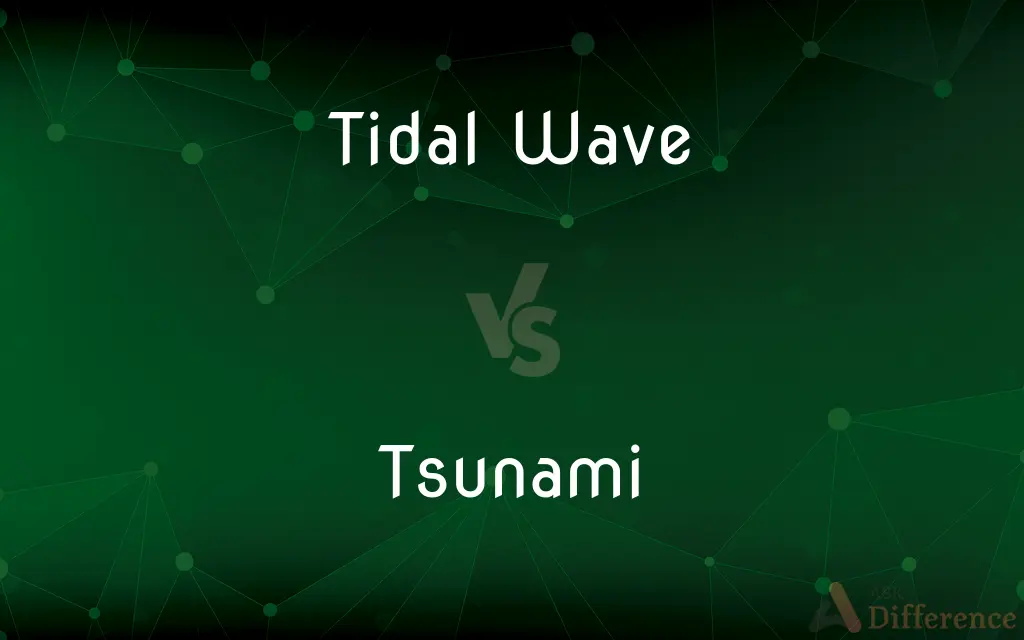Tidal Wave vs. Tsunami — What's the Difference?
Edited by Tayyaba Rehman — By Fiza Rafique — Published on November 14, 2023
Tidal Wave refers to large waves caused by tidal forces; Tsunami is a series of large ocean waves resulting from undersea disturbances, often with disastrous impact.

Difference Between Tidal Wave and Tsunami
Table of Contents
ADVERTISEMENT
Key Differences
Tidal Wave and Tsunami are terms often interchangeably used, but they refer to very different oceanic phenomena. A Tidal Wave is a misnomer often given to unusually high waves or surges driven by the gravitational interactions between the Earth, Moon, and Sun. On the other hand, Tsunamis are immense sea waves caused primarily by undersea disturbances such as earthquakes, volcanic eruptions, or underwater landslides.
Historically, the term Tidal Wave was used to describe what we now call Tsunamis. However, because Tsunamis have nothing to do with tides, the term has been largely replaced in scientific literature. Tidal Waves relate to tides, which are the daily rise and fall of sea levels influenced by the gravitational pull of celestial bodies.
In terms of impact, while Tidal Waves can result in coastal flooding, especially during high tide, their damage is relatively predictable and often less severe. Tsunamis, on the other hand, have the potential to cause catastrophic destruction, inundating coastlines and causing loss of life and property, especially when they strike without warning.
The speed and force with which these waves travel differ significantly. Tidal Waves, being influenced by astronomical factors, have a set pattern and timing. Tsunamis, however, can travel at high speeds across open ocean, reaching distant coastlines with reduced energy but still causing substantial harm.
In summary, while Tidal Waves are large waves influenced by gravitational forces and are somewhat predictable, Tsunamis are massive ocean waves caused by undersea disturbances and can result in widespread disaster.
ADVERTISEMENT
Comparison Chart
Cause
Gravitational pull of celestial bodies.
Undersea disturbances (e.g., earthquakes, volcanic eruptions)
Predictability
Relatively predictable (based on tidal cycles).
Unpredictable (depends on undersea events).
Impact
Coastal flooding, especially during high tide.
Can cause widespread disaster, inundating coastlines.
Historical Usage
Once used to describe Tsunamis.
Term has largely replaced "Tidal Wave" for such events.
Relation to Tides
Directly related to tides.
Not related to tides.
Compare with Definitions
Tidal Wave
Often misused to describe a Tsunami.
Earlier, people mistakenly referred to Tsunamis as Tidal Waves.
Tsunami
Tsunami is a series of massive ocean waves caused by undersea disturbances.
The earthquake triggered a Tsunami that affected multiple coastlines.
Tidal Wave
A surge in water resulting from gravitational interactions.
The Tidal Wave was particularly high due to the alignment of the Earth, Moon, and Sun.
Tsunami
Known for its catastrophic impact on coastlines.
The Tsunami inundated the entire coastal village, leaving it in ruins.
Tidal Wave
Not necessarily linked to any seismic activity.
Despite the earthquake, what we observed was a Tidal Wave, not a Tsunami.
Tsunami
Can result from earthquakes, volcanic eruptions, or underwater landslides.
The undersea landslide was the unexpected cause of the Tsunami.
Tidal Wave
Historically used in non-scientific contexts to describe large waves.
In many old books, large destructive waves were often termed Tidal Waves.
Tsunami
Wave height increases significantly as it approaches shallow waters.
As the Tsunami neared the coast, its height grew exponentially, overwhelming the harbor.
Tidal Wave
Tidal Wave refers to a large wave influenced by tidal forces.
The coastal town experienced a significant Tidal Wave during the spring tides.
Tsunami
Travels at high speeds across the open ocean.
Despite originating thousands of miles away, the Tsunami reached distant shores within hours.
Tsunami
A very large ocean wave caused by an underwater earthquake or volcanic eruption.
Tsunami
A very large and destructive wave, generally caused by a tremendous disturbance in the ocean, such as an undersea earthquake or volcanic eruption. Tsunami are usually a series of waves, or wave train.
Tsunami
(figurative) A large and generally unstoppable surge.
Tsunami
A huge destructive wave (especially one caused by an earthquake)
Common Curiosities
Which has the potential to cause more harm, a Tidal Wave or a Tsunami?
Tsunamis generally have a much higher potential for causing widespread disaster.
Why is the term "Tidal Wave" misleading when describing a Tsunami?
Because Tsunamis are not related to tides or tidal actions.
Are Tidal Wave and Tsunami the same thing?
No, Tidal Waves refer to waves influenced by tides, while Tsunamis are caused by undersea disturbances.
Can we predict when a Tidal Wave will occur?
Yes, Tidal Waves, being tied to tidal cycles, are relatively predictable.
What primarily causes a Tsunami?
Tsunamis are mainly caused by undersea earthquakes, but can also result from volcanic eruptions or underwater landslides.
Are Tidal Waves only caused by the Moon's gravitational pull?
While the Moon plays a significant role, the gravitational forces of both the Moon and the Sun contribute to tides and Tidal Waves.
How fast can a Tsunami travel in the open ocean?
Tsunamis can travel up to 500-800 kilometers per hour (310-500 miles per hour) in deep water.
Share Your Discovery

Previous Comparison
Balance Sheet vs. Income Statement
Next Comparison
Private Equity vs. Venture CapitalAuthor Spotlight
Written by
Fiza RafiqueFiza Rafique is a skilled content writer at AskDifference.com, where she meticulously refines and enhances written pieces. Drawing from her vast editorial expertise, Fiza ensures clarity, accuracy, and precision in every article. Passionate about language, she continually seeks to elevate the quality of content for readers worldwide.
Edited by
Tayyaba RehmanTayyaba Rehman is a distinguished writer, currently serving as a primary contributor to askdifference.com. As a researcher in semantics and etymology, Tayyaba's passion for the complexity of languages and their distinctions has found a perfect home on the platform. Tayyaba delves into the intricacies of language, distinguishing between commonly confused words and phrases, thereby providing clarity for readers worldwide.














































